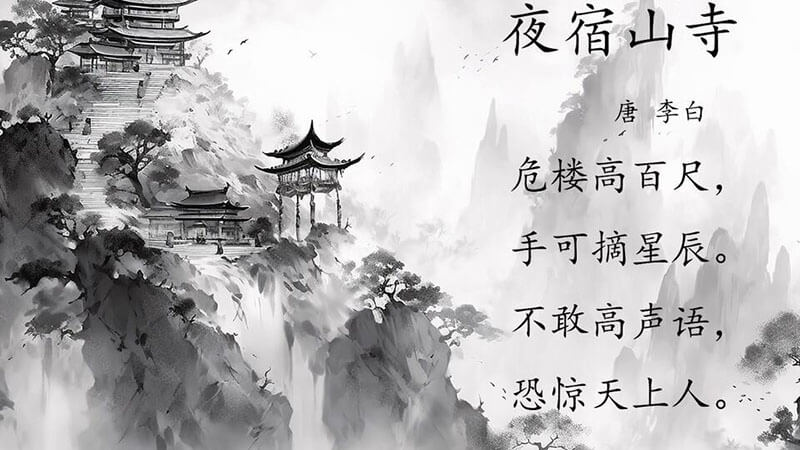The Summit Temple
- Poetry of Li Bai (Li Po)

危楼高百尺,手可摘星辰。
不敢高声语,恐惊天上人。
Hundred feet high the Summit Temple stands,
Where I could pluck the stars with my own hands.
At dead of night I dare not speak aloud
For fear of waking dwellers in the cloud.
The Summit Temple in present-day Hubei Province.
Li Bai was a poet renowned for his use of vivid imagery in depicting scenery in his poems. In this instance, he paints a picture of a towering yet heavenly building that seems to reach the stars. Although he never explicitly states the magnificence of this temple, his use of particular diction and sensory imagery allows his readers to experience the same awestruck wonder he felt when he saw this temple for the first time.
In the very first line, he surrounds the main subject of the poem, 楼 (temple), with two adjectives, 危 (dangerous) and 高 (tall), to immediately reveal the imposing height of the temple. The reader simply cannot miss the fact that the tower appears physically daunting. To build upon the diction, Li states that the temple is so tall that his hands can reach the stars in the night sky (perhaps the Chinese version of the Tower of Babel?). In referencing a human body part, Li makes the wondrous aspect of this tower more tangible and relatable to his readers. Furthermore, Li writes that he must speak softly for fear of awakening the celestial beings that live in the sky. The fact that someone from the temple can startle heavenly beings emphasizes its soaring structure. Through his use of imagery and diction, Li reveals the hushed grandeur of the towering temple.
- Why Chinese poems is so special?
- The most distinctive features of Chinese poetry are: concision- many poems are only four lines, and few are much longer than eight; ambiguity- number, tense and parts of speech are often undetermined, creating particularly rich interpretative possibilities; and structure- most poems follow quite strict formal patterns which have beauty in themselves as well as highlighting meaningful contrasts.
- How to read a Chinese poem?
- Like an English poem, but more so. Everything is there for a reason, so try to find that reason. Think about all the possible connotations, and be aware of the different possibilities of number and tense. Look for contrasts: within lines, between the lines of each couplet and between successive couplets. Above all, don't worry about what the poet meant- find your meaning.
List of Chinese poets
Pre-Qin Poetry
Han poetry
Ban Gu Cao Cao Cao Zhi Cao Pi Cai Wenji Kong Rong Liu Bang Liu Che Qin Jia Ruan Ji Su Wu Wang Can Xiang Yu Xu Gan Zhang Heng AnonymousSix Dynasties Poetry
Tao Yuanming Zhang HuaTang poetry
Bai Juyi Bao Junhui Cen Shen Chen Zi'ang Cui Hao Chang Jian Cui Tu Chen Tao Du Fu Du Mu Du Shenyan Dai Shulun Du Xunhe Du Qiuniang Gao Shi Gu Kuang Gao Pian Han Yu He Zhizhang Han Hong Huangfu Ran Han Wo Huang Chao Jia Dao Jiaoran Jin Changzu Li Bai (Li Po) Li He Li Shangyin Liu Yuxi Liu Zongyuan Luo Binwang Li Qi Liu Changqing Lu Lun Li Shen Li Yu Li Qiao Li Yi Liu Fangping Liu Zhongyong Li Ye Meng Haoran Meng Jiao Ma Dai Pei Di Qian Qi Quan Deyu Sikong Shu Song Zhiwen Shen Quanqi Shangguan Wan'er Xuanzong of Tang Wang Bo Wang Changling Wang Wei Wang Zhihuan Wei Yingwu Wen Tingyun Wang Han Wei Zhuang Wang Wan Xue Tao Xu Hun Xu Hui Yuan Zhen Yu Xuanji Yu Shinan Yuan Jie Zhang Jiuling Zhang Ji Zhang Hu Zhang Zhihe Zu Yong Zhang Xu Zhu Qingyu Zheng Tian Zhang Bi Zhang RuoxuSong Poetry
Cai Xiang Chao Chongzhi Fan Chengda Fan Zhongyan Huang Tingjian He Zhu Kou Zhun Jiang Kui Lu You Li Qingzhao Liu Yong Mei Yaochen Ouyang Xiu Pan Lang Qin Guan Qian Weiyan Su Shi Su Zhe Song Qi Wang Anshi Wen Tianxiang Weng Juan Xin Qiji Yang Wanli Yue Fei Yan Jidao Yan Shu Ye Shaoweng Zeng Gong Zhang Xian Zhou Bangyan Zhu Shuzhen Zhu Xi Zhou DunyiYuan poetry
Bai Pu Guan Hanqing Ma Zhiyuan Xu Zaisi Yang WeizhenMing poetry
Chen Jiru Tang Yin Tang Xianzu Xu Wei Yu Qian Yang ShenQing poetry
Cao Xueqin He Shuangqing Nalan Xingde Pu Songling Tsangyang Gyatso Wang Guowei Yuan Mei Zheng Xie Zhao Yi